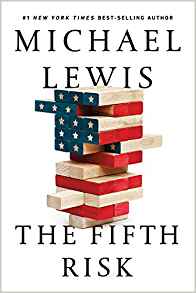 Michael Lewis, The Fifth Risk (New York: W.W. Norton, 2018), 219pp.
Michael Lewis, The Fifth Risk (New York: W.W. Norton, 2018), 219pp.
Not long ago I met a scholar from Norway who was spending his sabbatical at Stanford University. As we chatted he made an observation about the United States that has provoked my thinking ever since. He said, "here in America, you hate government. In Norway, we love government." Incredulous, I asked if he was serious, to which he responded yes.
At a minimum, as Michael Lewis observes, Americans have a love-hate relationship with the idea of a federal government. In some ways it is too close and invasive — it meddles in our lives with all sorts of regulations and laws. On the other hand, we blame government for being too absent and invisible — we're quick to blame it when it doesn't solve important problems, like responding to Hurricane Katrina. We don't celebrate people who have devoted their time and talents to civic service. We don't honor government employment as a noble and even necessary calling. We remain ignorant of how government works, and how it provides essential services that the private sector cannot, will not, and even should not fill.
According to Michael Lewis, Donald Trump never had anything that was remotely close to a normal transition team when he became the leader of the most powerful, most important, and most complicated government in the world (two million employees and four thousand political appointees). This was partly because Trump never wanted or expected to be president. He hadn't even prepared an acceptance speech (p. 28).
But it's far worse than that: Trump has remained willfully ignorant about how the federal government works, and why it is important. He actually shut down the transition team that Chris Christie had organized. Consequently, as Lewis documents in his book, when Trump became president, almost no one showed up to get briefings from the outgoing Obama administration. Many dozens of essential positions remained unfilled, and some of those he did appoint to important posts were corrupt and incompetent.
Nonetheless, and contrary to my expectations, Lewis's book is really an encouraging read about the many unsung heroes, people of tremendous talent, dedication, and noble motives, who serve in our federal government. We're familiar with many of the acroynms, like NASA, but many others do essential work we never consider, like the Patent Office, those in charge of the 2020 census, or the seventeen national labs that are run by the Department of Energy.
The title of Lewis's book comes from one of his many interviews with inspirational civil servants. With John MacWilliams, the first-ever chief risk officer at the DOE, he wanted to know the top five risks that keep him up at night. Those would be loose nukes, North Korea, Iran, the security of our electrical grid, and then something that sounds very mundane: "project management." Like cleaning up the environmental disaster in Hanford, Washington, that was left behind from making nuclear bombs in the 1940s. In other words, the "fifth risk" of "program management" is a metaphor for all the "existential threats that you never really even imagine are a risk," and that require a robust federal government to address. "It's the places in our government," writes Lewis, "where the cameras never roll that you have to worry about most." And under the current administration, now more than ever.
Dan Clendenin: dan@journeywithjesus.net


